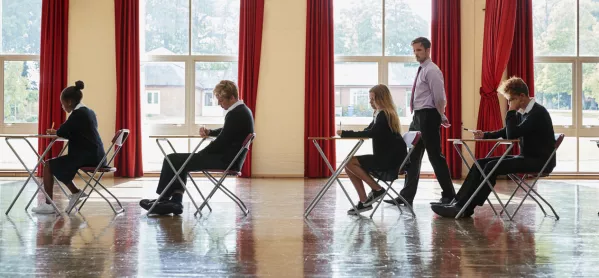Next year’s exam results should ideally be “pegged to a point” between grades achieved in 2019 and 2020 to “retain a degree of comparability”, the government and Ofqual have been told.
If certain alterations are made, so that the “vast majority” of students are given “a fair opportunity to demonstrate what they are capable of”, then comparable outcomes should be retained in 2021, according to the four major teaching unions.
This would involve setting grade boundaries “using the usual comparable outcomes process as a starting point”, and then increasing the percentage of students achieving each grade to “an agreed level” - set somewhere between what was seen in 2019 and 2020, they said.
Related: Prioritise exam students for Covid tests, DfE told
Exams U-turn: How will they stop grade inflation now?
Dominic Raab: ‘We will get it right next time’ on exams
The suggestion is part of a series of proposals put forward by the Association of School and College Leaders, the NAHT school leaders’ union, the NASUWT teachers’ union, the NEU teaching union and the National Governance Association.
GCSEs and A levels 2021: Finding a fair way to award grades
The organisations have made five key recommendations to the Department for Education and exam regulator, including allowing for “greater optionality in most subjects”, and prioritising exam students for Covid testing.
In a document submitted to schools minister Nick Gibb and Ofqual, the organisations said abandoning comparable outcomes without considering alternatives would risk “destabilising the system and devaluing students’ achievements”.
But “pegging results” to 2020 “punts the problem further down the road”, and basing outcomes on 2019 “risks further disadvantaging students whose education has been most disrupted”, they said.
“It is our view that, if only the minimal changes to 2021 currently promised take place, it would be unconscionable for comparable outcomes to apply as normal, and for students’ grades to be awarded as they were in 2019, using the relevant reference year in each subject,” the organisations said.
“However, implementing the more substantial changes we recommend here would, in our view, create a much fairer system, and go some way towards enabling students this year to demonstrate, and be rewarded for, what they have achieved despite the difficult circumstances.”
They added: “If these broader changes are made, in such a way that allows the vast majority of students a fair opportunity to demonstrate what they are capable of, our view is that comparable outcomes could be retained.
“Grade boundaries could be set using the usual comparable outcomes process as a starting point, and then altered by a number of marks to increase the percentage achieving that grade to an agreed level. That level could be somewhere between what was seen in 2019 and 2020.
“This would retain a degree of comparability and limit the extent of grade ‘inflation’ permitted, whilst also recognising the disrupted learning students have experienced this year.”





